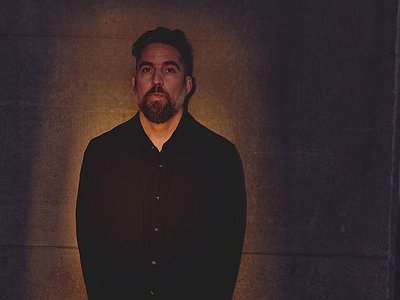Name: Jimmy LaValle
Nationality: American
Occupation: musician/composer
Current release: Future Falling on Eastern Glow Recordings
If you enjoyed this interview with The Album Leaf visit thealbumleaf.com to watch videos, buy music and learn about tour dates.
What was your first studio like?
My first studio was just a desk in the corner of the living room in my apartment. From then on I essentially continued down the trend of having a desk set up in whatever bedroom I had. It wasn’t until I moved to Los Angeles that I was able to get into the garage conversion, which is what I have now.
How and for what reasons has your set-up evolved over the years and what are currently some of the most important pieces of gear for you?
In my early days, my setup was somewhat simple. Fender Rhodes, Micro Korg on top, and various Moog synths spread throughout the stage. Ever since I started using Ableton for creation and playback, my setup is always evolving and changing based on what I'm going to perform. I do a lot of sample triggering and also use a couple of hardware synths live, a Novation Summit, Novation Peak and Make Noise 0-Coast. I've started to do more live audio manipulation, so I've implanted some key fx pedals and midi controllers to have quick access to delays, tremolos, reverbs, etc.
Currently, my novation synths, Eventide H9, and OTO machines Bam are my most important pieces of gear, both live and in the studio. I'm constantly cycling through different knob midi controllers to find the right now and I think I've found it with the Faderfox PC4. In the box, WOV by K Devices and Valhalla vintage verb are hands down my secret plug in weapons.
What motivates you to buy new gear: The curiosity to try new things, a specific function, something else entirely?
I'm not quite sure what makes my “buy now” button click, but typically, I look for anything that is new and exciting for sound design and other functions. I'm late to the boutique FX pedal trend, so I've been spending time going down those paths, but really, I'm always looking for a workhorse polyphonic synthesizer. I think that’s why the Novation Peak spoke to me immediately, I can design my own patch by clicking a single button and experimenting on the fly. Its ease of use beats anything else I've come across, for me at least.
How would you describe the relationship between technology and creativity for your work? How do you work with your production tools to achieve specific artistic results?
I use mostly hardware and use Ableton to save my patches within various songs I'm working on. Writing the pgm information into the clips makes it easy to recall my patches. I also utilize a lot of Ableton’s sampling power. I am constantly manipulating audio and resampling it. Ableton’s midi and audio routing tools come in handy as well. I also use sends to go into my hardware fx pedals. For live shows, I’ll utilize a similar signal path and also use Ableton to change my patches for each song with scene launches. There is also communication happening between two computers, one running audio and the other triggering our light show. Ableton is sending midi info over USB to the other computer.
Historically speaking, there has always been a close relationship between technological and artistic progress. Accordingly, there have been musical paradigm shifts accompanied by technological innovation. Which of these shifts do you rate particularly important?
What I appreciate are the tools I’m referring to above. With these technological tools now available to us without breaking the bank, we can use this to create a unique live experience. Put in the work, and it’ll just keep getting better.
Have there been technologies which have profoundly changed or even questioned the way you make music?
Midi and USB communication. Basic Midi Din communication is really, really powerful. You can also send midi over Bluetooth with little to no latency these days, which cuts down on cabling. And clearly, computers have changed how I perform music.
To some, the advent of AI and 'intelligent;' composing tools offers potential for machines to contribute to the creative process. Do you feel as though technology can develop a form of creativity itself? Is there possibly a sense of co-authorship between yourself and your tools?
If you’re in control of the tools and use them to your advantage in a creative way, I feel like you can retain a sense of co-authorship. I personally have no interest in using AI to do anything creative for me.
Do you personally see a potential for deeper forms of Artificial Intelligence in your music?
No. Not interested.
What tools/instruments do you feel could have a deeper impact on creativity but need to still be invented or developed?
That's a tough one. I feel like there are many good tools available, and I feel like I am always discovering new ways to use existing tools.




